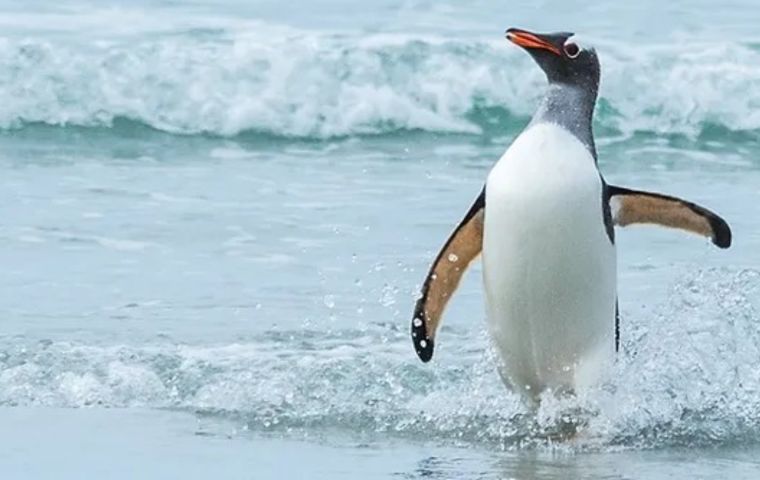MercoPress. South Atlantic News Agency
World Penguin Day: 9 out of 18 species breed in UK Overseas Territories, RSPB report
 Falkland Islands are nesting sites for five of the 18 species of penguin - King, Gentoo, Southern Rockhopper, Magellanic and Macaroni
Falkland Islands are nesting sites for five of the 18 species of penguin - King, Gentoo, Southern Rockhopper, Magellanic and Macaroni April 25 is World Penguin Day, from the impressive 1.2m tall Emperor Penguins of the British Antarctic Territory to the smaller, agile Southern Rockhopper Penguins of the Falkland Islands – nine out of 18 penguin species breed in the UK Overseas and British Antarctic Territories. Follows a report from the Royal Society for the Protection of Birds, RSPB.
The cold, marine rich environments surrounding these territories provide plentiful squid, krill, fish and crustaceans for penguins to feed on. The wild landscapes of the territories include rugged rocks, coastlines covered in high tussock grass, remote beaches and ice sheets which provide suitable habitat to raise their young in colonies, rookeries, which in some territories can reach up to over one million individuals
South Georgia & South Sandwich Islands – The ‘City of Penguins!’ Not far from Antarctica, the remote, ice-covered islands of South Georgia & South Sandwich Islands in the South Atlantic Ocean are home to millions of penguins
Known as the ‘City of Penguins’ the islands are home to one of the largest animal gatherings on earth, with over three million breeding pairs of Macaroni, around one million pairs of Chinstrap and hundreds of thousands of pairs of King and Gentoo penguins!
In 2021 the RSPB worked with the British Antarctic Survey, the Government of South Georgia and with other partners to satellite track Gentoo penguin movements which led to the extension of the Marine Protection Zone around South Georgia & South Sandwich Islands.
Tristan da Cunha - Northern Rockhopper Penguins. Tristan da Cunha, the world’s most remote inhabited island, situated in the middle of the South Atlantic Ocean is home to around 90% of the global population of Northern Rockhopper Penguins.
Known locally as Pinnamins, with long yellow crest feathers on their heads, these agile penguins can hop from rocks at great height!
In 2020 the Tristan community, with support from the RSPB and our partners (find out more here), designated the waters around their islands as a Marine Protection Zone, safeguarding the foraging grounds for penguins, seabirds, whales, and sharks and marine life.
The Tristan Conservation Department work closely with the RSPB to count, monitor, and study the Northern Rockhopper penguins, including tracking to monitor their foraging behaviour at sea
Falkland Islands – Gentoo, Magellanic, Southern Rockhopper Penguins. In the South Atlantic Ocean, the Falkland Islands are nesting sites for five of the 18 species of penguin - King, Gentoo, Southern Rockhopper, Magellanic and Macaroni.
The Magellanic Penguin is a summer visitor to the Islands, and it’s known locally as the ‘Jackass’ because of its donkey-like call!
36% of the world’s population of Southern Rockhopper Penguin (smaller and with a shorter yellow crest than the Northern Rockhopper) and 34% of the world’s population of Gentoo Penguins are found on the Falkland Islands.
The RSPB work with the territory-based organization - Falklands Conservation who rehabilitate penguins which have been oiled at sea, they also undertake monitoring of key penguin breeding sites and advocate for sustainable management of marine areas.
The RSPB are working with Falklands Conservation on the restoration of peatland by planting tussac grass to aid carbon capture and rebuild an important breeding habitat for penguins.
British Antarctic Territory – Emperor Penguins The British Antarctic Territory is a cold, dry, windy, western section of the Antarctic home to five breeding species of penguin - Emperor, Adelie, Chinstrap, Gentoo and Macaroni.
Emperor Penguins breed on sea ice and can withstand temperatures of -50˚C. If temperatures continue to rise as a result of climate change, the sea ice which they rely on as their breeding ground will be lost.
RSPB work in the UK Overseas Territories. RSPB works with the UK Government, territory governments and territory-based conservation organizations to improve wildlife sites, strengthen environmental policies, and build partner capacity. Our work on seabirds and penguins across the territories includes monitoring and research, protecting and managing their breeding grounds and feeding sites at sea.
We work with the UK Government Blue Belt Program who support the territories with marine protection and management. Combined, the marine zones of our UK Overseas Territories span over 1% of the global ocean! These small islands are making a big impact to our global ocean health by helping combat ocean threats such as climate change, illegal fishing and marine pollution.




Top Comments
Disclaimer & comment rulesCommenting for this story is now closed.
If you have a Facebook account, become a fan and comment on our Facebook Page!